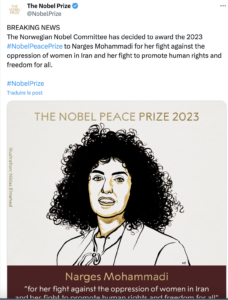“As we speak, she is still in prison.”
Imprisoned in Iran, the journalist and human rights activist Narges Mohammadi, aged 51, received on Friday, October 6, the prestigious award for “her fight against the oppression of women in Iran and her struggle to promote human rights and freedom for all,” announced Berit Reiss-Andersen, president of the Norwegian Nobel Committee, in Oslo.
After a year of resistance from the “Woman, Life, Freedom” movement in Iran, among the 351 nominations registered this year, the Nobel Peace Committee finally chose to honor and encourage the cause of women in Iran. On Friday, October 6, it crowned Narges Mohammadi, the Iranian activist imprisoned in the Islamic Republic, a leading figure and symbol of unveiled women who fight for their fundamental rights despite bloody repression.
“Give the Nobel Peace Prize to Iranian women,” pleaded Per Olav Ødegård, editorialist of the Norwegian newspaper VG. The name of Narges Mohammadi, journalist and Iranian human rights activist, detained in Evin Prison in Tehran, appeared to be a consensus choice. This Iranian activist, also laureate of the RSF Courage Prize, continues her struggle from prison — a struggle that, for almost six months, has resonated profoundly with the “Woman, Life, Freedom” movement.
Narges Mohammadi has been arrested 13 times and sentenced five times over the past 25 years, for a total of 31 years in prison and 154 lashes for her commitment against compulsory hijab for women and against the death penalty. She was sentenced again in 2021 for “propaganda against the political system,” for defamation, and for “rebellion” against prison authorities. She was accused of publishing a statement against the death penalty and organizing a protest sit-in during her detention at Evin Prison in Tehran. According to Reporters Without Borders (RSF), she is the victim of “a real judicial harassment.”
“Narges is the most determined person I know,” said her husband Taghi Rahmani, who has been a refugee in France since 2012 with their twin children, now aged 17. She has not seen her children for eight years. The awarding of the Nobel Peace Prize to Narges Mohammadi represents “a historic and significant moment for the struggle for freedom in Iran,” her family said in a written statement on Friday. “We dedicate this prize to all Iranians, and especially to Iranian women and girls who have inspired the world through their courage and fight for freedom and equality,” the family added.

Vice President of the Center for Human Rights Defenders, founded by Shirin Ebadi, she follows in the footsteps of Ebadi, who also won the Nobel Peace Prize in 2003. Narges Mohammadi, currently detained in Tehran, is the second Iranian woman to win the Nobel Peace Prize.
“I appeal to Iran: free her, do something worthy, and release the Nobel laureate,” urged Ms. Reiss-Andersen in Oslo. “If the Iranian authorities make the right decision, they will free her. She could then be present to receive this honor, which is what we most hope for,” insisted the international institution.
Upon the announcement of her award, UN Secretary-General António Guterres stated: “The Nobel Peace Prize awarded today to Narges Mohammadi is an important reminder that the rights of women and girls face severe resistance, including through the persecution of women human rights defenders in Iran and elsewhere.” This Nobel Peace Prize is a tribute to all women who fight for their rights at the risk of their freedom, their health, and even their lives.
Since the establishment of the Islamic Republic in 1979, a series of discriminatory laws against women have been enacted, turning them into second-class citizens. Indeed, the first law of Khomeini’s regime was to make the wearing of the Islamic veil compulsory for all women.
While the “Woman, Life, Freedom” uprising triggered a wave of outrage and unprecedented mobilization throughout the country, the judicial and executive authorities of Iran submitted on May 21, 2023, a bill to parliament “to support the culture of chastity and hijab,” without any decisive reaction from the international community to this gender discrimination against Iranian women.
According to this bill, non-compliance with hijab is defined as “nudity” and would lead to harsher penalties, including fines, vehicle confiscation, deprivation of social rights, and imprisonment from six months to three years.
The law also extends these punitive measures, fines, and sanctions to owners and managers of public places such as shops, restaurants, cinemas, sports facilities, leisure venues, and art institutions.
On Monday, September 18, Dr. Javaid Rehman called on the EU to do more to protect human rights. He added: “Regarding the issue of women and girls in Iran, what is happening is not only discrimination and harassment against them, but clearly a form of sexual apartheid.”
Furthermore, eight other UN human rights experts, in a joint statement, affirmed: “The bill concerning women could be described as a form of gender apartheid, as the authorities appear to govern through systemic discrimination aimed at repressing women and girls into total submission.”
“The global support and recognition of my human rights work make me more determined, more responsible, more passionate, and full of hope,” reacted Narges Mohammadi in a written statement to The New York Times after the announcement. “I also hope this recognition will make Iranians who protest for change stronger and more organized. Victory is near,” she added.
After a year of counter-revolution, the bravery and patriotism of the Iranian people have impressed the world. Iranians from all social classes — dissidents, political opponents, intellectuals, writers, actors, filmmakers, students, unionists, lawyers, and activists — are, at the risk of their lives, determined and organized to restore a political system based on universal values and to resist the dark legacy of the 1979 Islamic Revolution.
They are inside Iran. They — women and men — need massive support from Europe.
Nazila Golestan, TV Producer and Spokesperson of Iran HamAva
